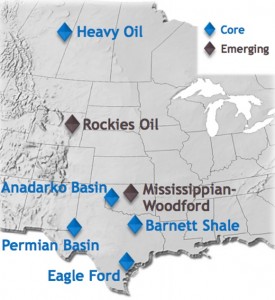Devon Energy completed the sale of its Canadian conventional assets to Canadian Natural Resources for $2.7 billion after taxes.
The company will use the money to pay down debt acquired from a $6 billion purchase of GeoSouthern's Eagle Ford assets, which was completed on February 28th.
Read more: Devon Acquires Eagle Ford Assets from GeoSouthern for $6 Billion
Devon considers its' Eagle Ford Shale acreage as core to its portfolio, and plans on divesting its non-core US assets by the end of the year. Devon's other US core areas are in the Barnett Shale, Anadarko Basin and Permian Basin. The Mississippian-Woodford and the Powder River and Wind River Basins in the Rockies are emerging assets in the company's portfolio.
Devon's 2014 Eagle Ford Outlook
In 2014, Devon plans on investing $1.1 billion in the Eagle Ford and will drill more than 200 wells. The company estimates average net production through October, 2014, of 70,000 – 80,000 boe/d in the play, with peak average production estimates in the play of ~140,000 boe/d over the next several years.
After the sale of it's Canadian assets are completed, Devon will retain it's Lloydminster and Horn River area heavy oil assets, located in Eastern Alberta.
Read more at devonenergy.com

